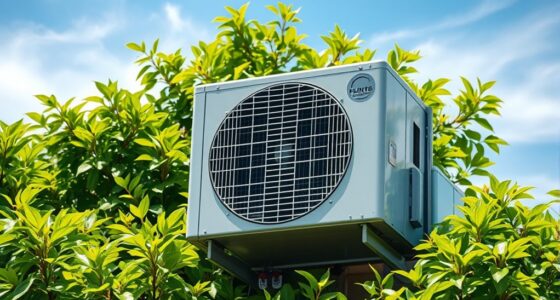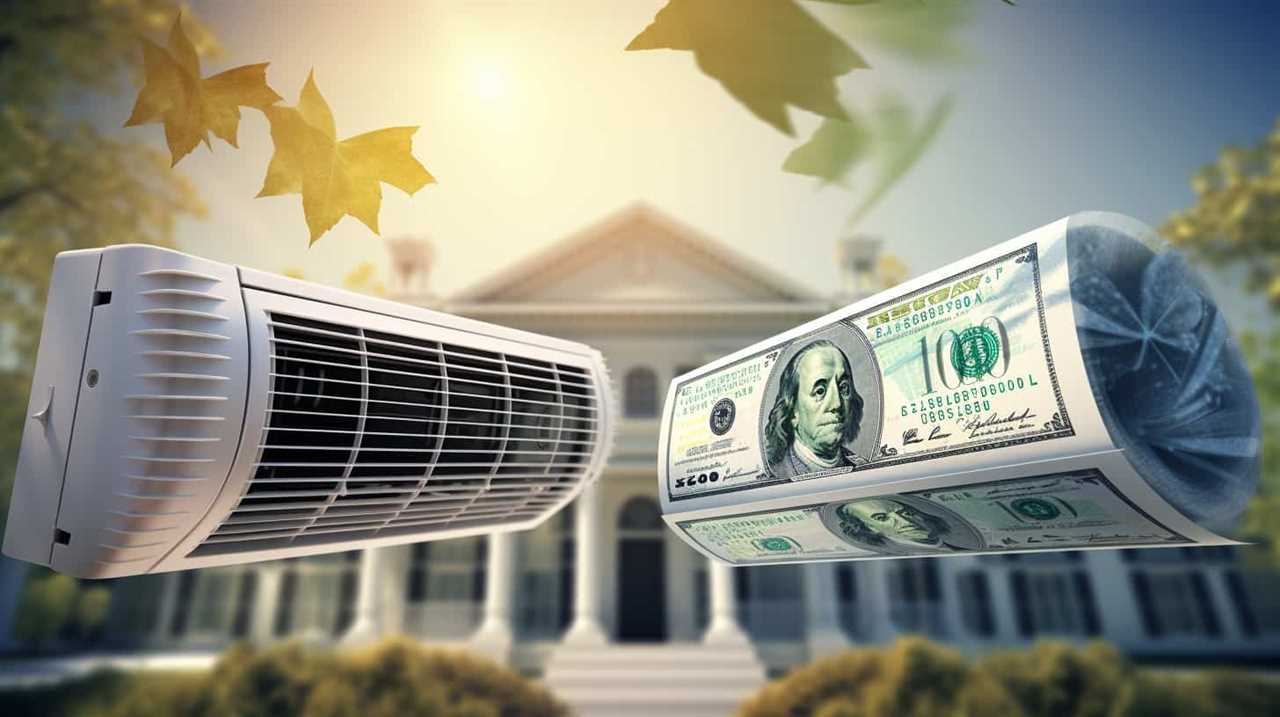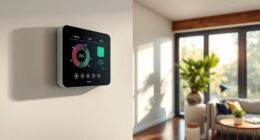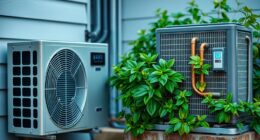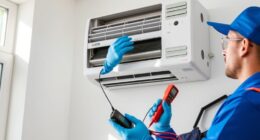Seeking the ideal heat pump air conditioning system? Search no more! In our guide for beginners, we will guide you through all the essential information for choosing the perfect heat pump for your residence.
From understanding cooling and heating efficiency to sizing considerations and exploring different types, we’ve got you covered.
We’ll even dive into energy efficiency ratings, noise levels, and additional features.
Get ready to find the perfect air conditioning heat pump that will keep you cool and comfortable all year round.
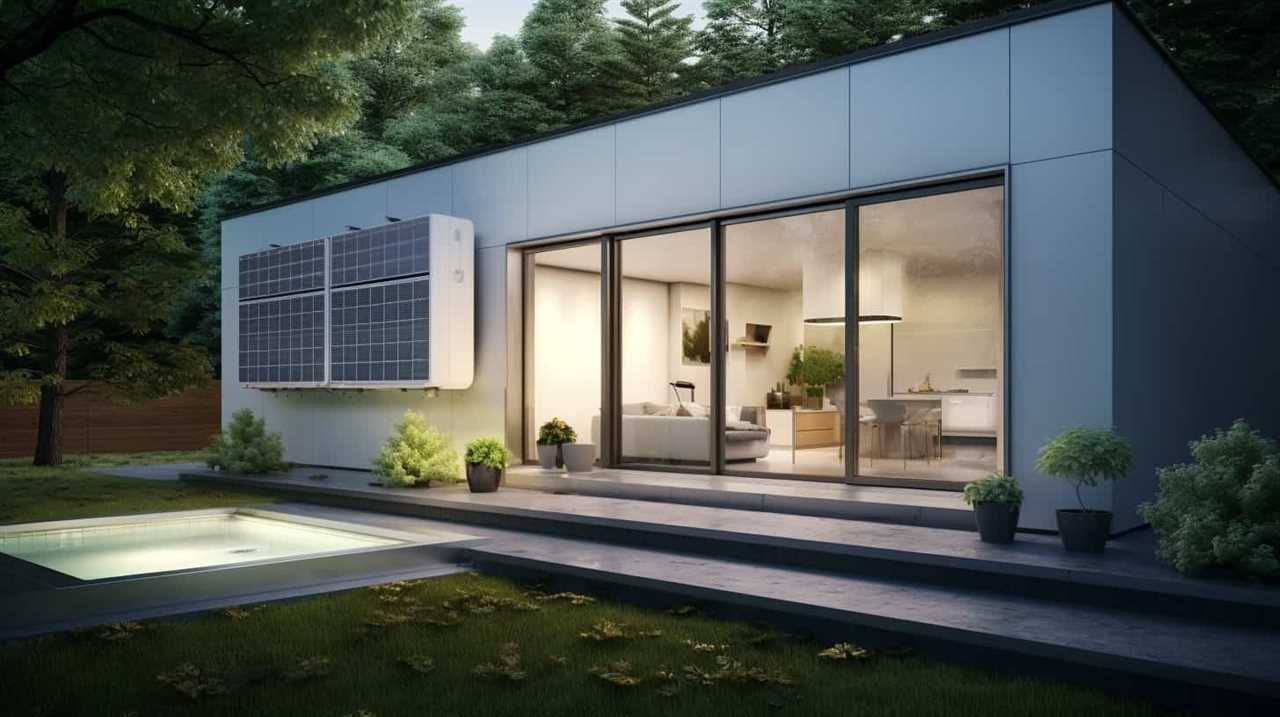
Key Takeaways
- SEER and HSPF ratings are important for evaluating the cooling and heating efficiency of air conditioning heat pumps.
- Maintenance requirements and understanding the defrosting process are crucial for maintaining cooling efficiency in colder climates.
- Coefficient of Performance (COP) is a key factor in determining the heating efficiency of heat pumps.
- Sizing considerations, such as room size, layout, climate, and insulation, are important factors to consider when selecting a heat pump.
Understanding the Basics of Air Conditioning Heat Pumps
As we delve into the topic of understanding the basics of air conditioning heat pumps, it’s important to grasp the concept of how they work. Air conditioning heat pumps are designed to transfer heat from one place to another, providing both cooling and heating capabilities.
To evaluate their energy consumption, it’s crucial to consider their seasonal energy efficiency ratio (SEER) and heating seasonal performance factor (HSPF). SEER indicates the cooling efficiency, while HSPF measures the heating efficiency.
Understanding defrost cycles is also essential as it ensures the heat pump’s performance during colder temperatures. Defrost cycles help remove ice build-up on the outdoor unit’s coils, allowing the heat pump to function optimally.
Evaluating the Cooling Efficiency of Heat Pumps
We can evaluate the cooling efficiency of heat pumps by considering factors such as the seasonal energy efficiency ratio (SEER) and the unit’s ability to effectively remove heat from the indoor space.

To help you understand the cooling efficiency of heat pumps, here are four important points to consider:
-
SEER: The SEER rating indicates the efficiency of the heat pump in cooling mode. Higher SEER ratings mean better energy efficiency and lower operating costs.
-
Heat Removal Capacity: A heat pump’s ability to effectively remove heat from the indoor space is crucial for efficient cooling. Look for a heat pump with a high heat removal capacity to ensure optimal cooling performance.
-
Evaluating Maintenance Requirements: It’s important to consider the maintenance requirements of a heat pump. Look for models that are easy to clean and maintain, as this can help maximize cooling efficiency and ensure long-term performance.

-
Understanding the Defrosting Process: Heat pumps can experience frost buildup during cold weather, affecting their cooling efficiency. Understanding the defrosting process and choosing a heat pump with an efficient defrosting mechanism is essential for maintaining cooling efficiency in colder climates.
Determining the Heating Efficiency of Air Conditioning Heat Pumps
How can we determine the heating efficiency of air conditioning heat pumps?
When evaluating the heating performance of a heat pump, the key factor to consider is its Coefficient of Performance (COP). The COP is a measure of the ratio between the heat output and the energy input of the heat pump. A higher COP indicates a more efficient heat pump. To calculate the COP, we divide the heat output by the energy consumption. The heat output is measured in British thermal units (BTUs) or kilowatts (kW), while energy consumption is measured in kilowatt-hours (kWh). By comparing the COP values of different heat pumps, we can determine which one will provide the most efficient heating performance.
Understanding the COP is crucial when selecting an air conditioning heat pump to ensure optimal energy efficiency.
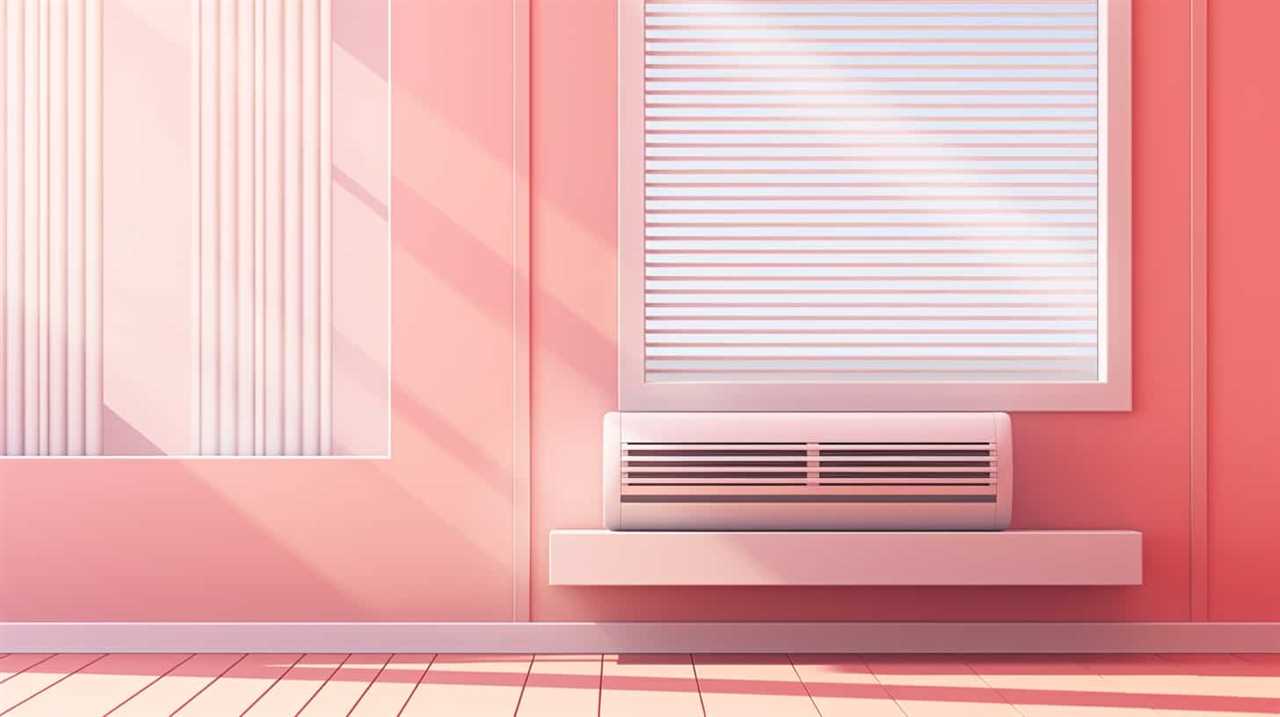
Now, let’s move on to discussing the sizing considerations for heat pumps in air conditioning.
Sizing Considerations for Heat Pumps in Air Conditioning
When determining the sizing considerations for heat pumps in air conditioning, there are several key factors to take into account.
The first is the room size and layout, as larger rooms may require more powerful heat pumps to adequately cool the space.
Additionally, the climate in which the heat pump will be used and the level of insulation in the building are important considerations, as they can impact the efficiency and effectiveness of the heat pump.
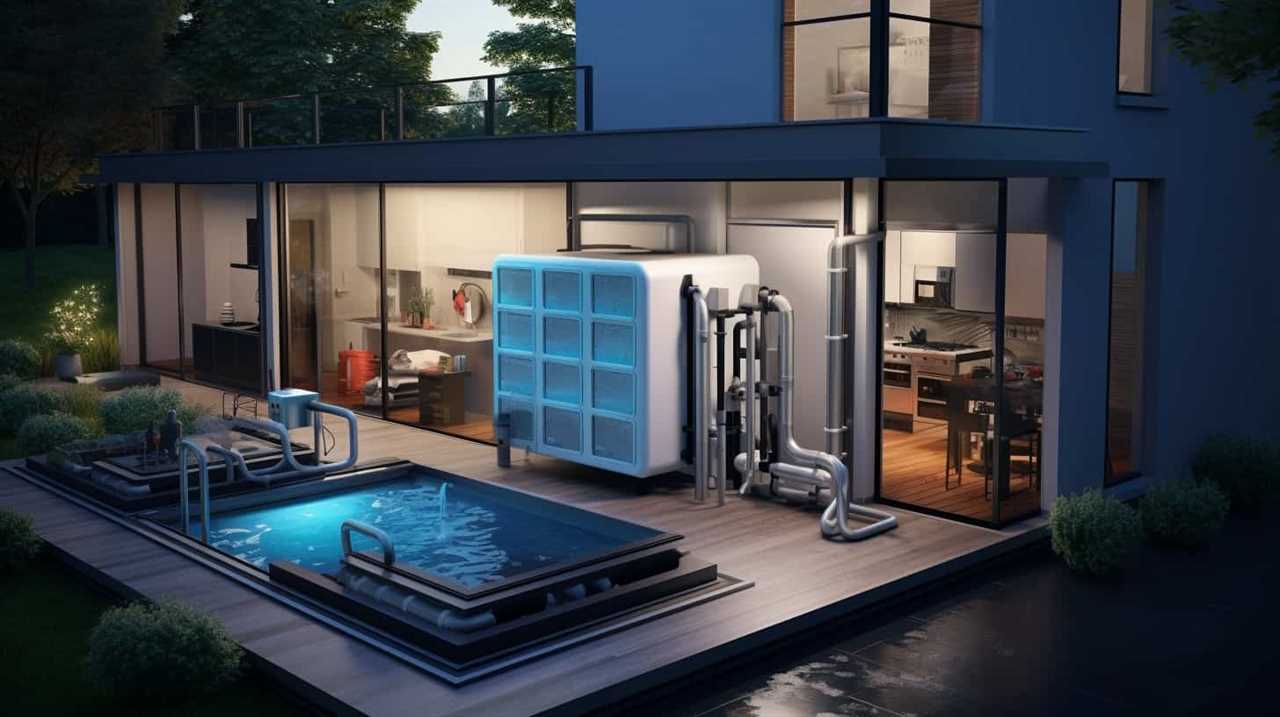
Room Size and Layout
For optimal performance, it’s important to consider the size and layout of the room when selecting an air conditioning heat pump. The room size and layout play a crucial role in determining the effectiveness and efficiency of the heat pump.
Here are some key factors to consider:
-
Room Temperature: The size of the room directly affects the amount of cooling or heating required. A larger room will require a more powerful heat pump to achieve the desired room temperature.
-
Airflow Patterns: The layout of the room influences the airflow patterns. It’s important to choose a heat pump that can effectively distribute air throughout the room, ensuring even cooling or heating.
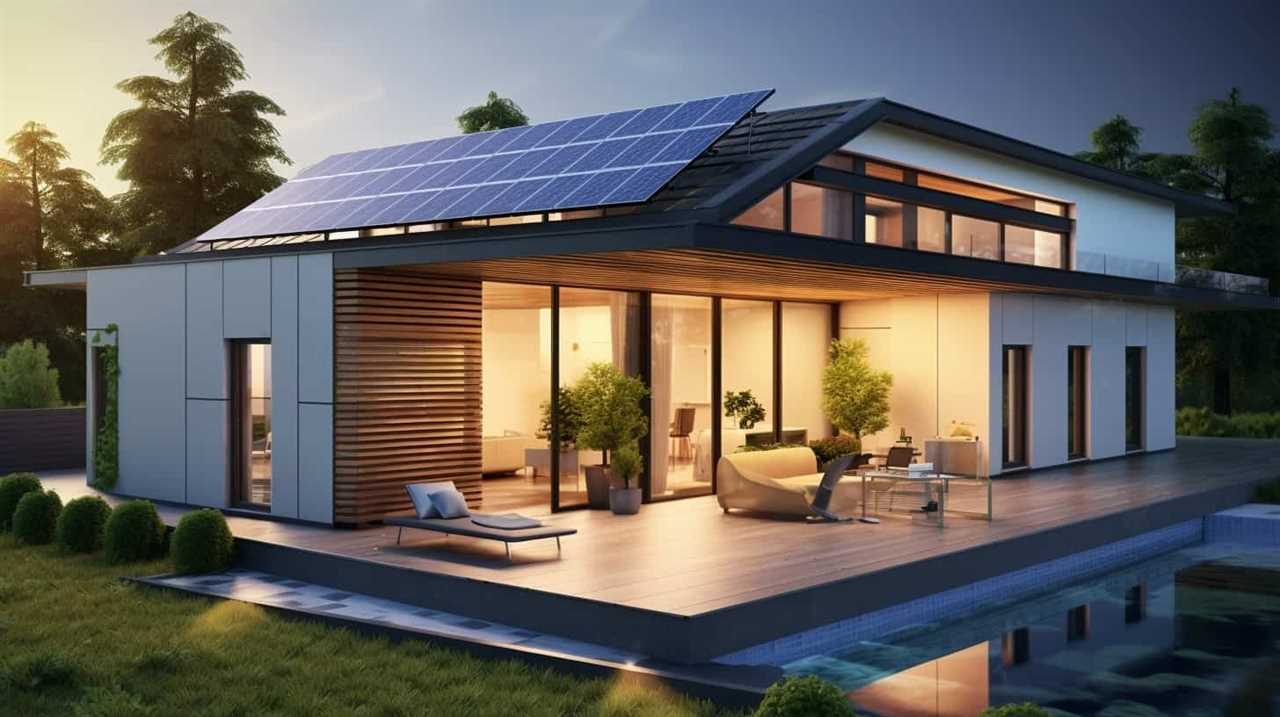
-
Obstacles and Furniture Placement: The presence of obstacles such as walls, furniture, or partitions can affect the airflow and temperature distribution. Consider the placement of the heat pump and ensure that it can overcome any obstacles in the room.
-
Ceiling Height: Rooms with high ceilings may require a heat pump with increased capacity to effectively cool or heat the space.
Climate and Insulation
Considering the climate and insulation of our space is critical in determining the appropriate sizing for heat pumps in air conditioning. The climate affects the heat load of the space, while insulation helps to retain the conditioned air and reduce energy consumption. To ensure optimal performance and energy efficiency, it is important to choose the right size heat pump based on these factors.
When evaluating the climate, consider the average temperature range and humidity levels throughout the year. This information can be obtained from local weather data or HVAC professionals. Insulation materials also play a crucial role in maintaining a comfortable indoor environment. Common insulation materials include fiberglass, cellulose, foam board, and spray foam. Each material has its own thermal conductivity and R-value, which determines how well it resists heat transfer.

To provide a comprehensive overview, here is a table summarizing some energy-saving tips and popular insulation materials:
| Energy-Saving Tips | Insulation Materials |
|---|---|
| Properly seal windows and doors | Fiberglass |
| Use weatherstripping to seal gaps | Cellulose |
| Install attic insulation | Foam board |
| Insulate walls and floors | Spray foam |
By considering the climate and insulation of our space, we can select the appropriate size and type of heat pump to maximize energy efficiency and overall comfort. Now, let’s explore different types of air conditioning heat pumps.
SUBSEQUENT SECTION: ‘Exploring Different Types of Air Conditioning Heat Pumps’
Exploring Different Types of Air Conditioning Heat Pumps
We will now explore the different types of air conditioning heat pumps. When it comes to selecting the ideal heat pump for your needs, it’s important to consider factors such as room temperature and energy consumption. Here are four types of air conditioning heat pumps to consider:
-
Split System: This type of heat pump consists of an indoor and outdoor unit connected by refrigerant lines. It’s energy-efficient and provides both heating and cooling.
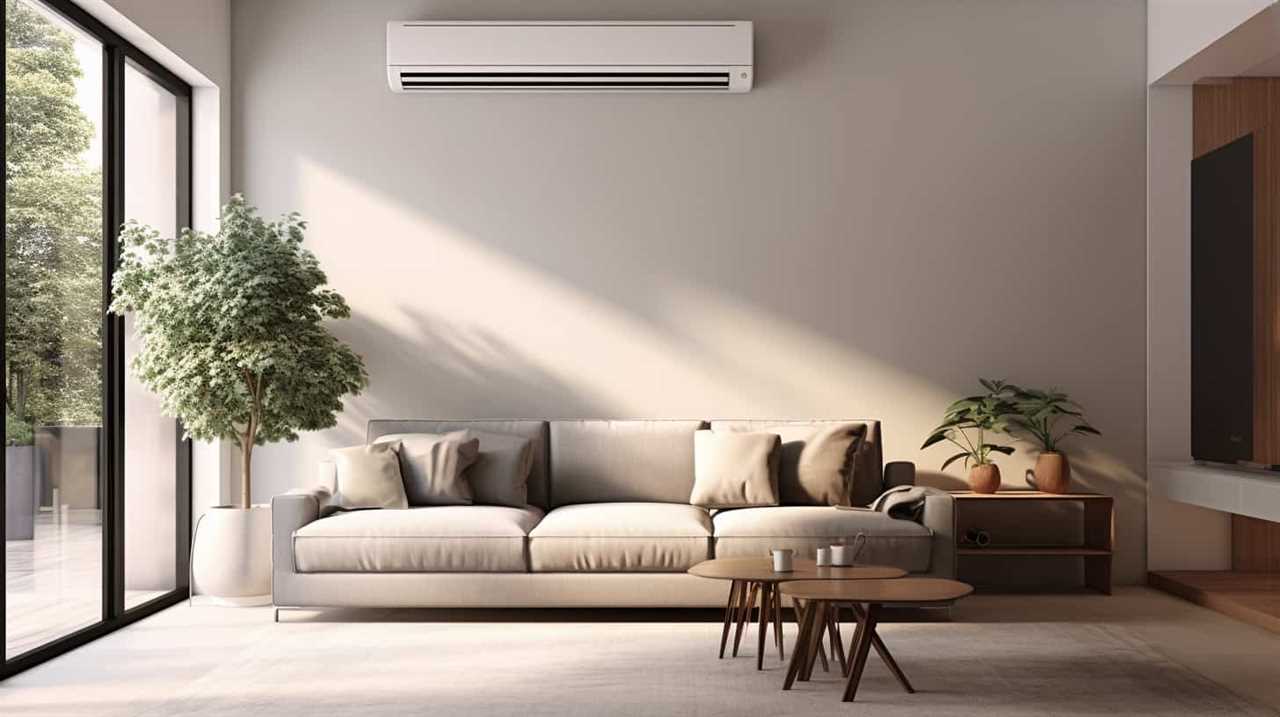
-
Ductless Mini-Split: Ideal for homes without ductwork, this heat pump uses individual units in each room to provide personalized temperature control.
-
Geothermal Heat Pump: This eco-friendly option utilizes the stable temperature of the earth to provide efficient heating and cooling.
-
Packaged Heat Pump: Suitable for limited space, this all-in-one unit is installed outside and provides both heating and cooling.
Comparing Single-Zone and Multi-Zone Heat Pump Systems
Let’s compare the efficiency and functionality of single-zone and multi-zone heat pump systems.

When it comes to the installation process, single-zone heat pump systems are generally easier and less time-consuming to install compared to multi-zone systems. This is because single-zone systems only require the installation of one indoor unit and one outdoor unit, making them more straightforward.
On the other hand, multi-zone heat pump systems require the installation of multiple indoor units, each with its own set of refrigerant lines. This can be more complex and time-consuming, especially if there are many indoor units involved.
In terms of cost comparison, single-zone heat pump systems are typically less expensive than multi-zone systems. This is because the installation process for single-zone systems is simpler and requires fewer components.
Additionally, single-zone systems are often more energy-efficient compared to multi-zone systems, which can lead to long-term cost savings on energy bills.

Now that we’ve compared the efficiency, functionality, and cost of single-zone and multi-zone heat pump systems, let’s move on to examining energy efficiency ratings for heat pumps.
Examining Energy Efficiency Ratings for Heat Pumps
To understand the energy efficiency of heat pumps, we need to examine their energy efficiency ratings. These ratings are essential in determining the performance and cost-effectiveness of a heat pump system.
Here are four important factors to consider when examining energy efficiency ratings:
-
SEER (Seasonal Energy Efficiency Ratio) rating: This measures the cooling efficiency of the heat pump during the cooling season. The higher the SEER rating, the more energy-efficient the heat pump is.

-
HSPF (Heating Seasonal Performance Factor) rating: This measures the heating efficiency of the heat pump during the heating season. A higher HSPF rating indicates better energy efficiency.
-
Importance of energy efficiency: Energy-efficient heat pumps consume less energy, resulting in lower utility bills and reduced environmental impact. They also provide better comfort and longer lifespan.
-
Choosing the right rating: Consider your climate, usage patterns, and budget when selecting a heat pump with the most suitable SEER and HSPF ratings for your needs.
Understanding and considering these energy efficiency ratings will help you make an informed decision when selecting the ideal heat pump for your air conditioning needs.
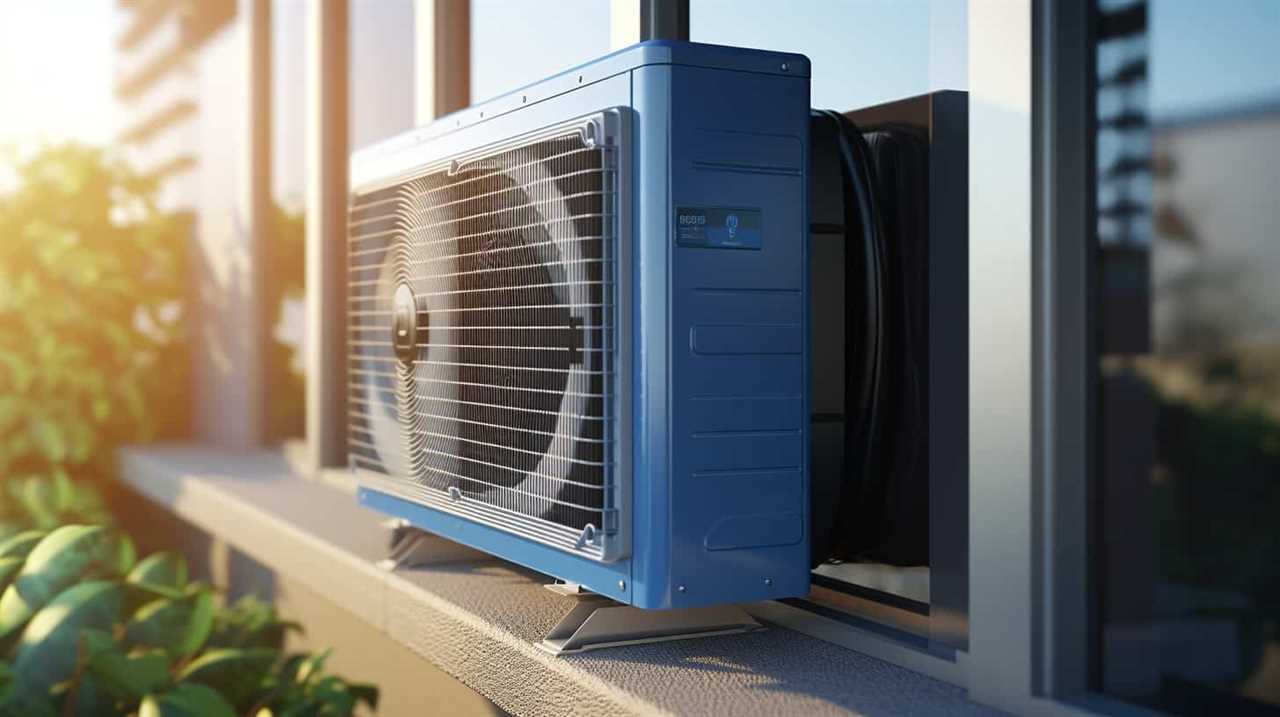
Assessing Noise Levels and Sound Ratings for Heat Pumps
When selecting an air conditioning heat pump, it’s important to consider the noise levels it produces. Sound rating standards, such as the decibel (dB) scale, can help in assessing the noise level of a heat pump.
Opting for a heat pump that operates quietly can provide benefits such as a peaceful environment and reduced disturbance.
Noise Level Importance
We will now discuss the importance of noise levels and sound ratings for heat pumps. When selecting an air conditioning heat pump, it’s crucial to consider the noise it produces. Here are four reasons why noise levels are important:
-
Comfort: A noisy heat pump can disrupt your peace and relaxation, especially in bedrooms or living areas.
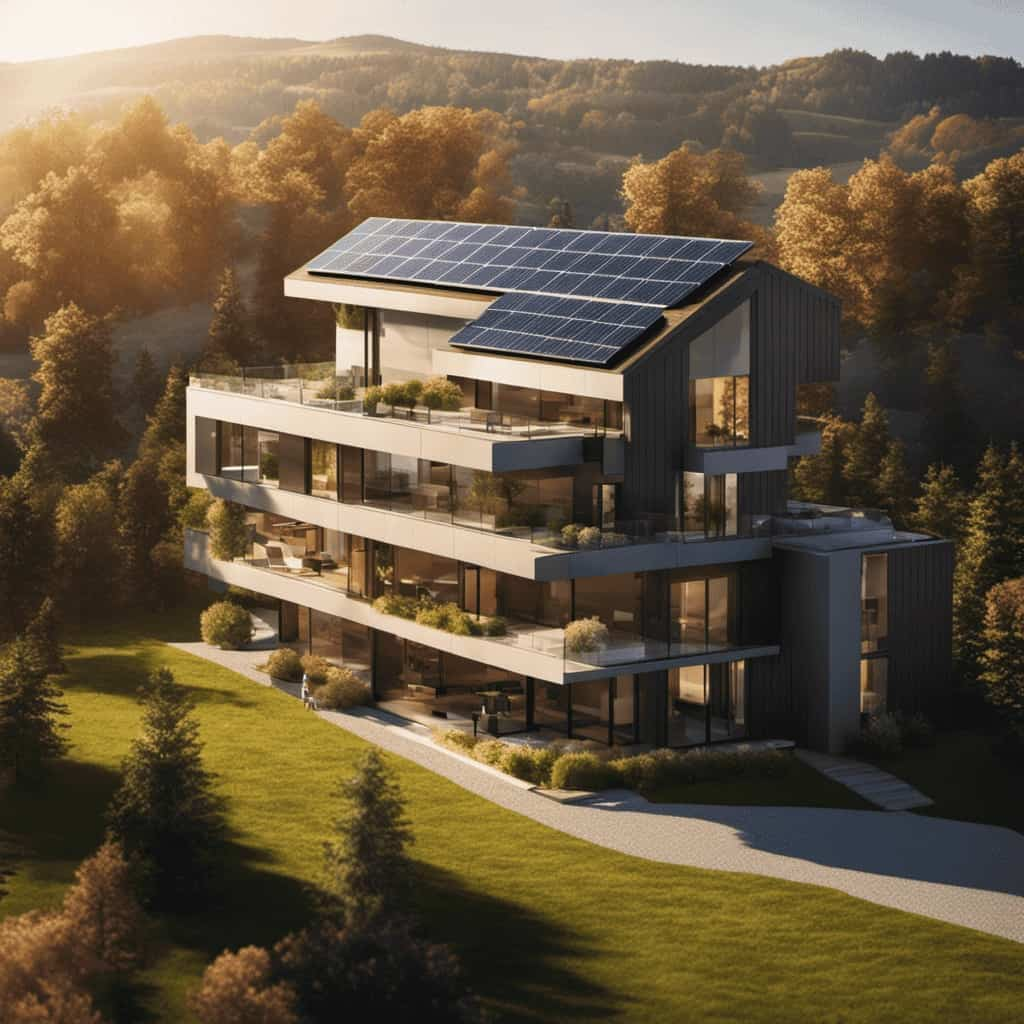
-
Neighborly consideration: Excessive noise can disturb your neighbors, leading to potential conflicts.
-
Soundproofing options: Lower noise levels allow for easier implementation of soundproofing measures, such as acoustic panels or insulation.
-
Maintenance requirements: Noisy heat pumps may indicate underlying issues that require regular maintenance or repairs.
By prioritizing low noise levels and sound ratings, you can ensure a comfortable and peaceful environment while minimizing the risk of neighbor complaints.
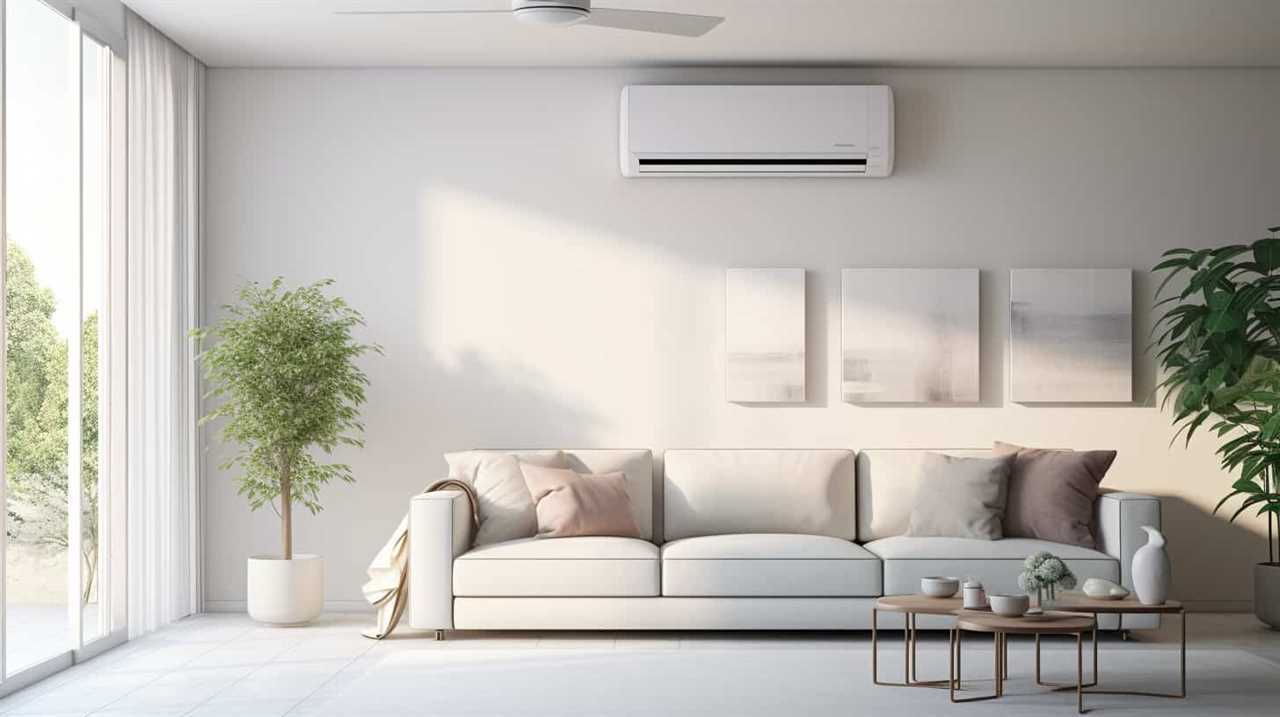
Additionally, quieter heat pumps may also require less maintenance, saving you time and money in the long run.
Sound Rating Standards
Our goal is to understand the sound rating standards and assess the noise levels and sound ratings for heat pumps.
When it comes to sound rating standards, the Air Conditioning, Heating, and Refrigeration Institute (AHRI) has established guidelines to help consumers evaluate the noise levels of heat pumps. The sound rating of a heat pump is measured in decibels (dB), with lower values indicating quieter operation.
To make an informed decision, it’s important to consider the sound rating of a heat pump and compare it to your soundproofing options. Additionally, it’s crucial to understand the maintenance requirements of your chosen heat pump to ensure optimal performance and noise reduction.

Quiet Operation Benefits
To fully appreciate the advantages of a heat pump’s quiet operation, we must assess the noise levels and sound ratings. When selecting an air conditioning heat pump, it’s important to consider the noise it produces. Here are four key factors to consider:
-
Soundproofing options: Look for heat pumps that come with built-in soundproofing features or that can be easily soundproofed. This will help reduce noise levels and create a more peaceful environment.
-
Maintenance requirements: Regular maintenance can help keep your heat pump running smoothly and quietly. Make sure to clean or replace air filters as recommended and schedule professional maintenance to address any potential noise issues.
-
Sound ratings: Pay attention to the sound ratings provided by manufacturers. Heat pumps with lower sound ratings produce less noise and are ideal for those who prioritize quiet operation.
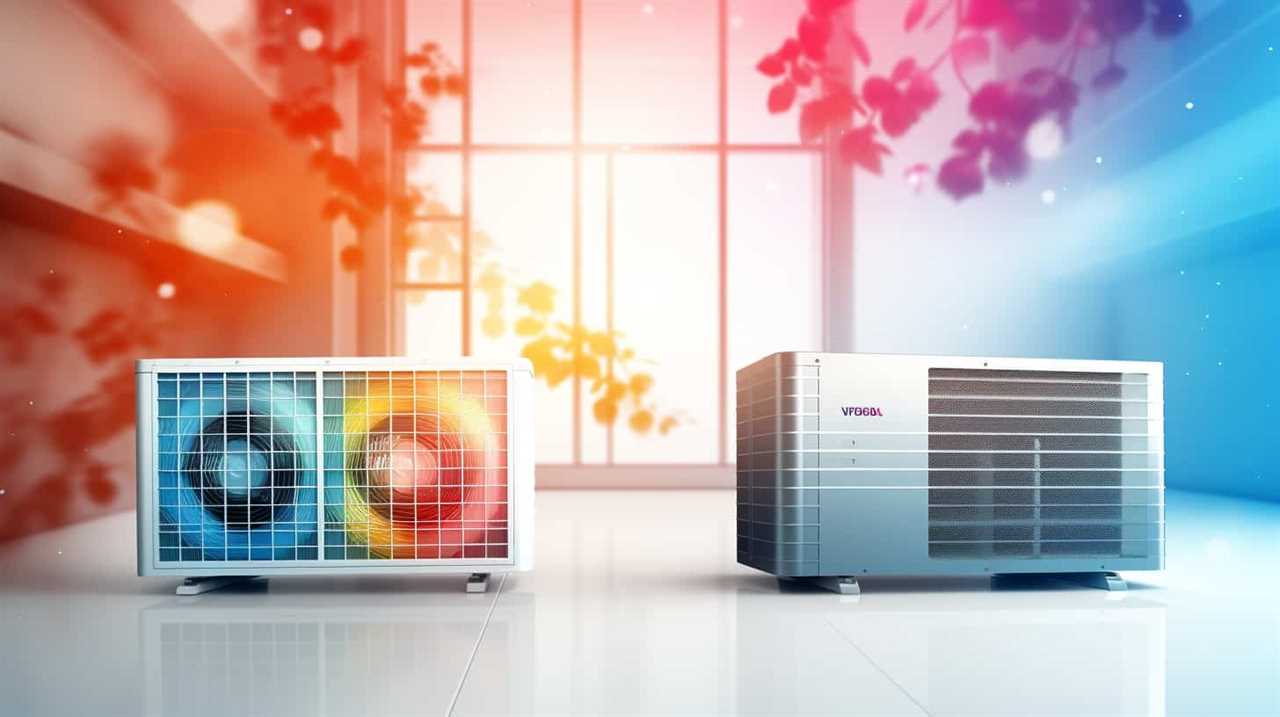
-
Noise reduction features: Some heat pumps are equipped with noise reduction technologies such as advanced compressor insulation or variable speed fans. These features help minimize noise levels and provide a more comfortable living space.
Considering Additional Features and Technology in Heat Pumps
When considering additional features and technology in heat pumps, it’s important to evaluate their energy efficiency and compatibility with your existing HVAC system.
Smart technology has become a popular feature in modern heat pumps, allowing for remote control and monitoring through smartphone apps. This technology enables users to adjust temperature settings, set schedules, and receive energy usage reports, all from the convenience of their mobile device.
Energy saving features are also crucial to consider, as they can help reduce utility bills and minimize environmental impact. Look for heat pumps with features such as programmable thermostats, energy-efficient compressors, and variable-speed fans. These features optimize energy usage by adjusting output based on the specific needs of the space being heated or cooled.
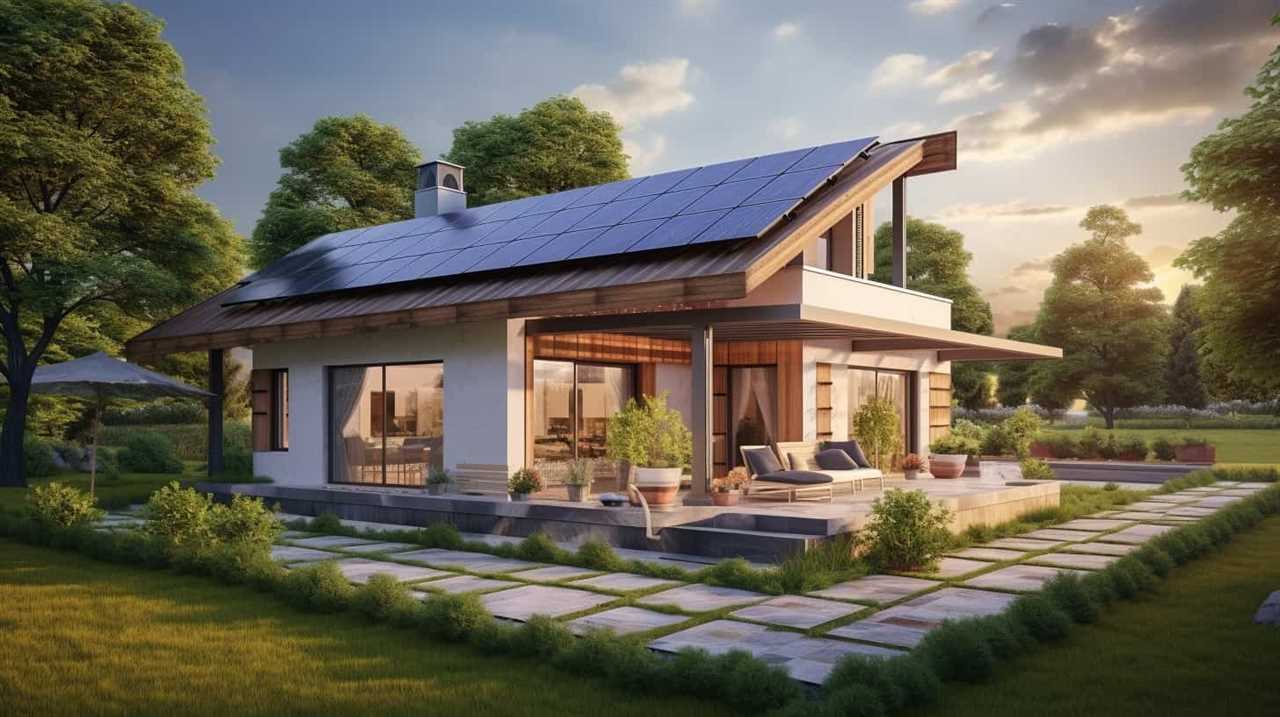
Tips for Finding the Right Air Conditioning Heat Pump for Your Home
When it comes to finding the right air conditioning heat pump for your home, there are a few key points to consider.
First, energy efficiency ratings play a crucial role in determining how well the heat pump will perform and how much energy it will consume.
Second, proper sizing is essential to ensure that the heat pump is capable of effectively cooling or heating your home.
Lastly, professional installation is vital to ensure that the heat pump operates efficiently and safely.
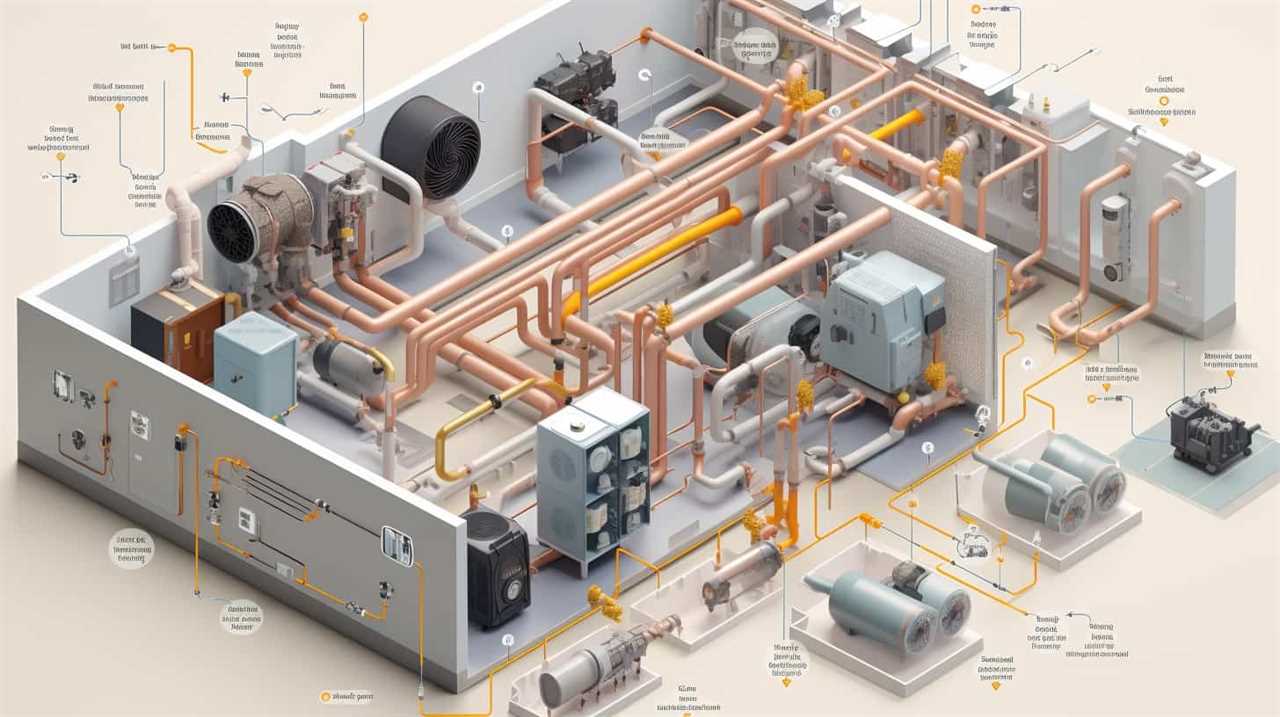
Energy Efficiency Ratings
We recommend considering three key energy efficiency ratings when selecting an ideal air conditioning heat pump for our home. These ratings will help us determine the unit’s energy-saving capabilities and maintenance requirements. Here are the ratings to look out for:
-
Seasonal Energy Efficiency Ratio (SEER): This rating measures the cooling efficiency of the heat pump. Higher SEER ratings indicate better energy efficiency.
-
Heating Seasonal Performance Factor (HSPF): HSPF measures the heating efficiency of the heat pump. Look for a higher HSPF rating to ensure optimal energy savings during colder months.
-
Energy Efficiency Ratio (EER): EER measures the cooling efficiency of the heat pump at a specific outdoor temperature. A higher EER rating signifies better energy efficiency under specific conditions.
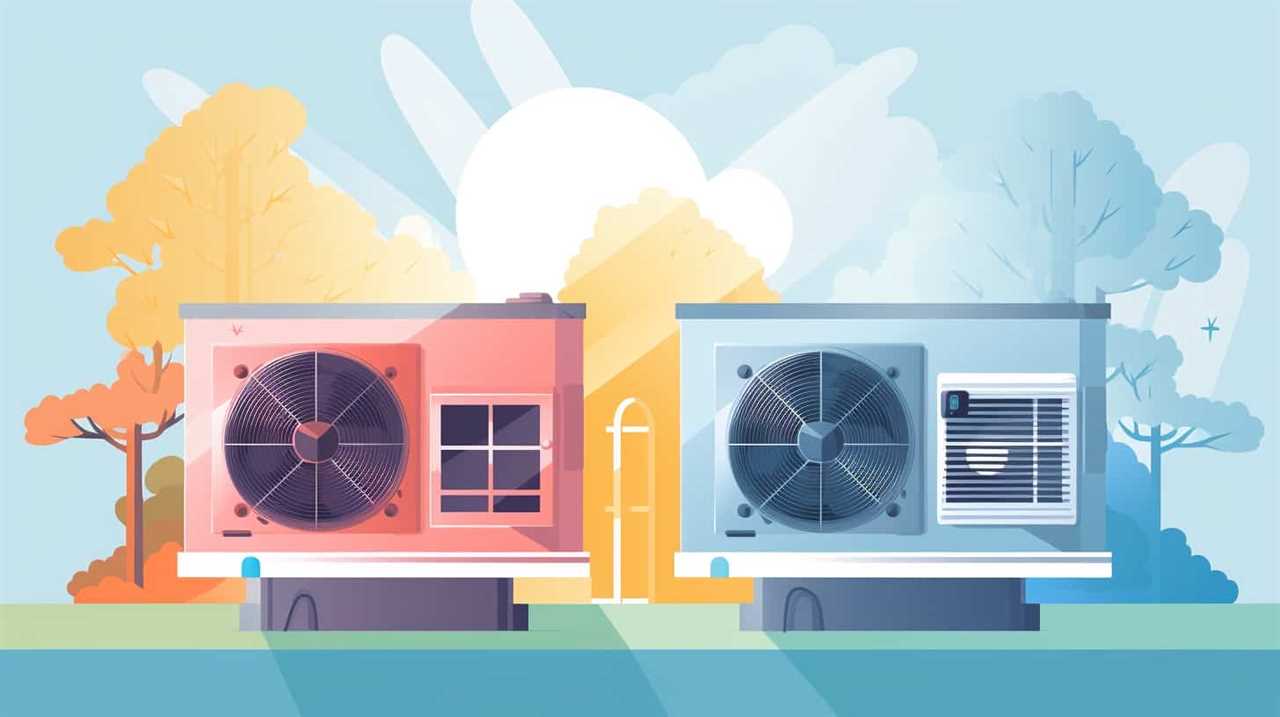
-
Coefficient of Performance (COP): COP measures the ratio of heating or cooling output to the amount of electricity consumed. A higher COP rating indicates better energy efficiency.
Considering these energy efficiency ratings will help us choose a heat pump that maximizes energy savings while minimizing maintenance requirements.
Proper Sizing and Installation
To ensure the proper sizing and installation of our air conditioning heat pump, we need to follow these tips.
First, it’s crucial to accurately determine the size of the heat pump required for your home. This involves considering factors such as the square footage of the space, insulation levels, and climate conditions. A professional HVAC technician can perform a load calculation to determine the appropriate size.
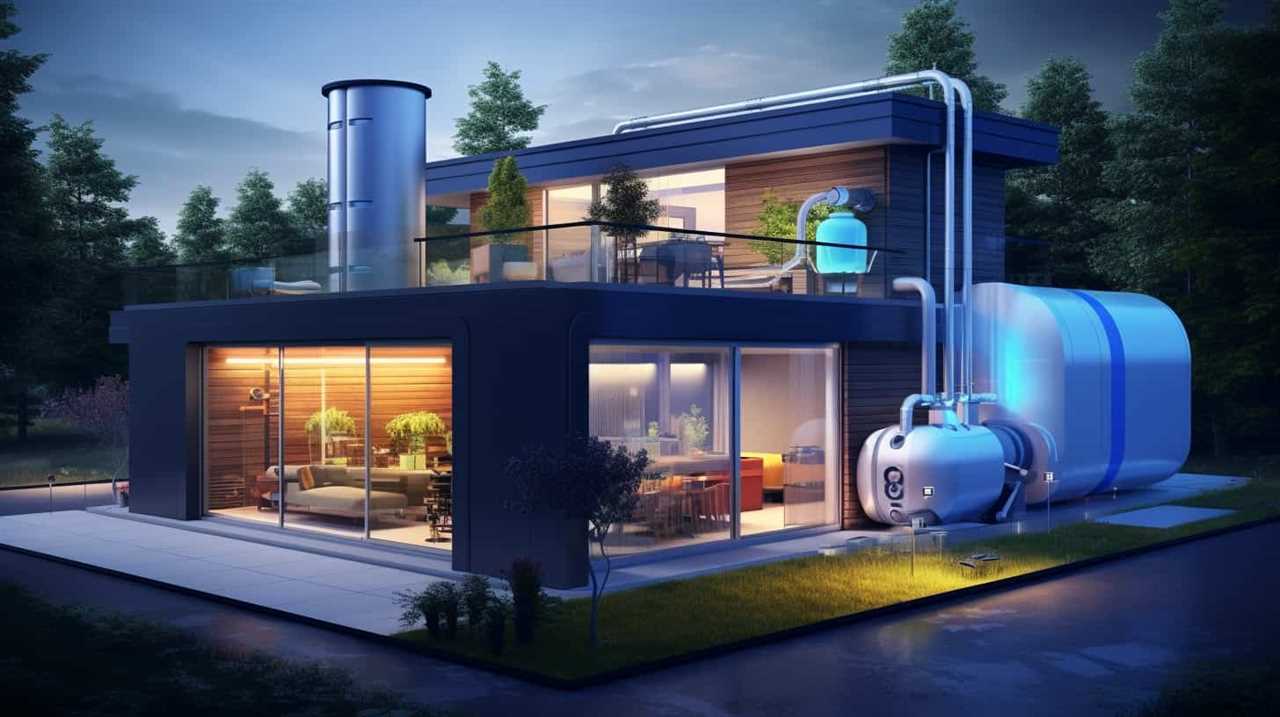
Additionally, proper installation is essential for optimal performance and energy efficiency. It’s recommended to hire a licensed and experienced contractor for the installation process. This will ensure that the heat pump is installed correctly and that all necessary connections, electrical wiring, and refrigerant levels are properly adjusted.
Investing in a well-installed heat pump can save you money in the long run by reducing air conditioning installation costs and ensuring proper heat pump maintenance.
Frequently Asked Questions
What Are the Maintenance Requirements for Air Conditioning Heat Pumps?
We’ll provide air conditioning heat pump maintenance tips and address common issues. Regular filter cleaning, coil inspection, and condensate drain clearing are essential. Checking refrigerant levels, electrical connections, and fan operation is also recommended.
Can Air Conditioning Heat Pumps Be Used in All Types of Climates?
Yes, air conditioning heat pumps can be used in all types of climates. They are efficient compared to traditional air conditioners and can help you choose the right size for your home.
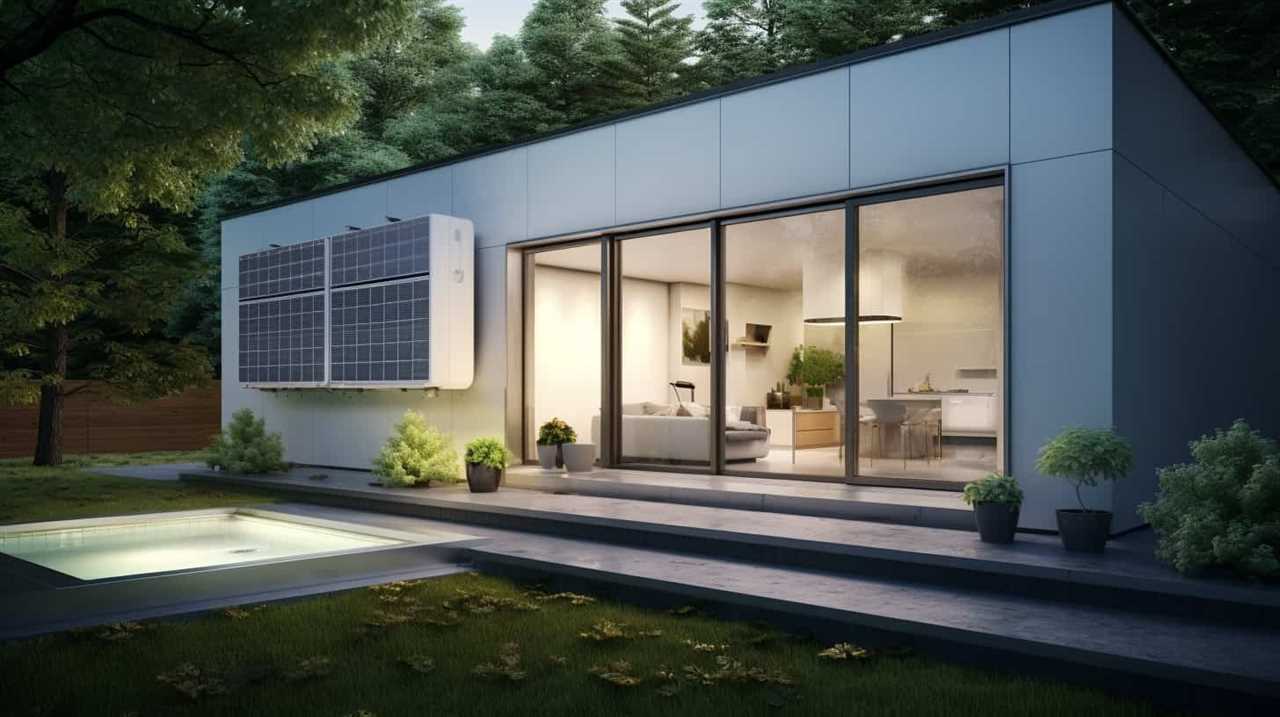
Are There Any Government Rebates or Incentives Available for Purchasing Air Conditioning Heat Pumps?
Yes, there are government rebates and incentives available for purchasing air conditioning heat pumps. These incentives aim to promote energy efficiency and reduce carbon emissions. They vary by region and can help offset the cost of installation and operation.
How Long Is the Typical Lifespan of an Air Conditioning Heat Pump?
The typical lifespan of an air conditioning heat pump can vary depending on factors such as usage, maintenance, and environmental conditions. However, with proper care and regular servicing, these units can last up to 15-20 years.
What Is the Average Cost of Installing an Air Conditioning Heat Pump?
The average cost of installing an air conditioning heat pump depends on various cost factors such as the size of the unit, the complexity of the installation, and the desired energy efficiency.
Conclusion
In conclusion, selecting the ideal air conditioning heat pump requires a careful evaluation of cooling and heating efficiency, sizing considerations, and energy efficiency ratings.

It’s also important to assess noise levels, additional features, and technology.
By considering these factors and exploring different types of heat pumps, homeowners can make an informed decision that will provide optimal comfort and energy savings for their homes.
Remember, finding the right heat pump is essential for a comfortable and efficient cooling and heating system.



